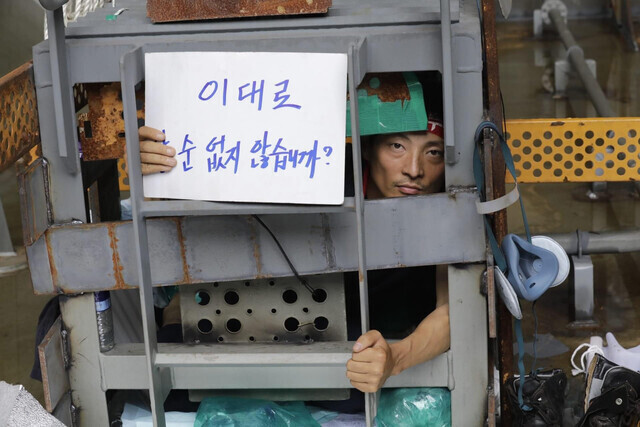hankyoreh
Links to other country sites 다른 나라 사이트 링크
[Editorial] Subcontracted workers aren’t to blame for Korean shipbuilding’s crisis

As a strike by the shipbuilding subcontractor chapter of the Korea Metal Workers Union (KMWU) reached its 47th day on Monday, South Korean President Yoon Suk-yeol declared that “illegal situations at industry workplaces must be brought to an end.”
In a joint statement credited to the Ministry of Economy and Finance and four other Cabinet offices, the administration warned that the striking workers “must be held responsible in terms of criminal punishment and compensation.” Kweon Seong-dong, floor leader for the ruling People Power Party, went even further, denouncing the strike as an “act of terrorism.”
After sitting on the sidelines while the events unfolded, the administration and ruling party made statements the same day attacking the striking workers and hinting at a possible forceful response.
When the president and his administration and party claim that the subcontractor employees’ strike is “illegal,” they are completely ignoring the fact that they had been requesting negotiations with individual subcontracting companies since June of last year, but that those requests were declined.
They have made no reference whatsoever to the harsh realities that have driven Yu Choe-an, vice president of the shipbuilding subcontractors’ chapter, to lock himself up for nearly a month in a “metal prison” measuring just 1 square meter at the base of a boat amid broiling temperatures. All they do is parrot the reports by some media about the “hundreds of billions of won in damages resulting from the strike.”
Before the administration and People Power Party launched their onslaught against the striking workers, the Chosun Ilbo newspaper published a big story the same day about how subcontracting companies were “tearfully shutting down one after another.” According to the Hankyoreh’s reports, however, many of those companies had been heading toward closures with poor business performance since before the strike; others were found to be far behind on their premiums for the four major forms of insurance.
As the company issuing orders, Daewoo Shipbuilding and Marine Engineering (DSME) bears the lion’s share of responsibility for its subcontractors’ financial struggles. It previously was hit with 15.3 billion won (US$11.7 million) in penalties from the Fair Trade Commission for practices between 2015 and 2019, where it used various forms of trickery to pay its subcontracting companies prices that were less than their manufacturing costs.
The industry is well aware that subcontracting businesses have no leeway or autonomy when it comes to negotiations. Yet DSME and its majority shareholder, the Korea Development Bank, foisted the negotiations off on the subcontractors. That amounts to telling them not to negotiate at all.
The claim that the strike is causing the company to miss out on opportunities to fulfill orders that are pouring in is also a misrepresentation of the facts.
Subcontracting work at shipyards is so notorious for low wages and strenuous conditions that even migrant workers avoid it. Once skilled workers leave, they don’t come back. The shipbuilding industry right now is threatened with an ecosystem collapse because it can’t find people willing to work in the conditions it offers.
Shipbuilding is a prime example of a labor-intensive industry, and skilled workers are its backbone. So the demands for recovery of wages that have been cut by fully 31% since 2014 is not just a matter of trying to score a “payday.”
Instead of devising a forceful response to the strike, what the administration should be doing right now is playing an active mediating role, and coming up with basic alternatives that can contribute to restoring the shipbuilding ecosystem.
Please direct questions or comments to [english@hani.co.kr]

Editorial・opinion
![[Guest essay] The real reason Korea’s new right wants to dub Rhee a founding father [Guest essay] The real reason Korea’s new right wants to dub Rhee a founding father](https://flexible.img.hani.co.kr/flexible/normal/500/300/imgdb/original/2024/0423/8317138574257878.jpg) [Guest essay] The real reason Korea’s new right wants to dub Rhee a founding father
[Guest essay] The real reason Korea’s new right wants to dub Rhee a founding father![[Column] ‘Choson’: Is it time we start referring to N. Korea in its own terms? [Column] ‘Choson’: Is it time we start referring to N. Korea in its own terms?](https://flexible.img.hani.co.kr/flexible/normal/500/300/imgdb/original/2024/0423/3617138579390322.jpg) [Column] ‘Choson’: Is it time we start referring to N. Korea in its own terms?
[Column] ‘Choson’: Is it time we start referring to N. Korea in its own terms?- [Editorial] Japan’s rewriting of history with Korea has gone too far
- [Column] The president’s questionable capacity for dialogue
- [Column] Are chaebol firms just pizza pies for families to divvy up as they please?
- [Column] Has Korea, too, crossed the Rubicon on China?
- [Correspondent’s column] In Japan’s alliance with US, echoes of its past alliances with UK
- [Editorial] Does Yoon think the Korean public is wrong?
- [Editorial] As it bolsters its alliance with US, Japan must be accountable for past
- [Guest essay] Amending the Constitution is Yoon’s key to leaving office in public’s good graces
Most viewed articles
- 1[Guest essay] The real reason Korea’s new right wants to dub Rhee a founding father
- 2Terry Anderson, AP reporter who informed world of massacre in Gwangju, dies at 76
- 3[Column] ‘Choson’: Is it time we start referring to N. Korea in its own terms?
- 4Why Korea shouldn’t welcome Japan’s newly beefed up defense cooperation with US
- 5Opposition calls Yoon’s chief of staff appointment a ‘slap in the face’
- 6[Column] The clock is ticking for Korea’s first lady
- 7Senior doctors cut hours, prepare to resign as government refuses to scrap medical reform plan
- 8New AI-based translation tools make their way into everyday life in Korea
- 9[Editorial] Japan’s rewriting of history with Korea has gone too far
- 10[Column] Are chaebol firms just pizza pies for families to divvy up as they please?